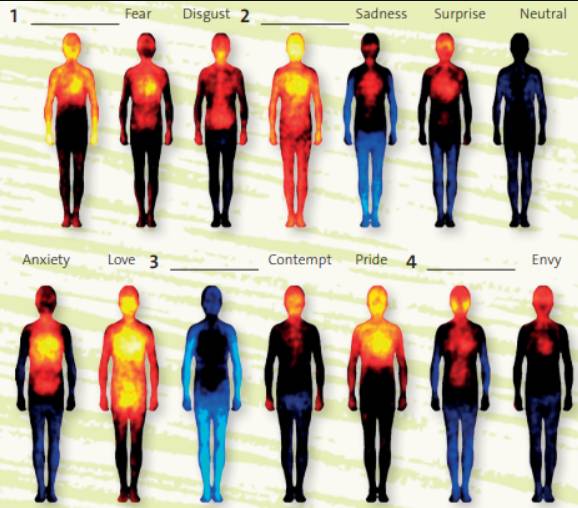Noun (danh từ) | Adjective (tính từ) |
1 anger | angry |
anxiety | 2 anxious |
3 shame | ashamed |
4 envy | envious |
5 happiness | happy |
pride | 6 proud |
7 sadness | sad |
8 surprise | surprised |
3E. Word Skills
Đúng 0
Bình luận (0)
Các câu hỏi tương tự
Read the article and look at the pictures. Match the underlined words in the article with pictures 1-4.A gut feeling?Emotions do not just occur in your mind; they also have a physical effect on your body. A group of scientists from Finland decided to find out which emotions affect which parts of the body. They asked 701 volunteers to colour in silhouettes in response to emotional words, stories and videos. The results show that the people generally experience emotions like anger, envy and shame ...
Đọc tiếp
Read the article and look at the pictures. Match the underlined words in the article with pictures 1-4.
A gut feeling?
Emotions do not just occur in your mind; they also have a physical effect on your body. A group of scientists from Finland decided to find out which emotions affect which parts of the body. They asked 701 volunteers to colour in silhouettes in response to emotional words, stories and videos. The results show that the people generally experience emotions like anger, envy and shame in similar ways.
For example, when you're angry, you probably feel that anger mostly in your chest and head. But if you feel ashamed, you probably notice it in your face and, in particular, your cheeks. Depression makes your whole body feel less active, whereas happiness affects your whole body in a positive way.
'Hot' colours like yellow and red show an increase in activity, while blue shows the opposite. Black is neutral.

USE OF ENGLISH Complete the sentence with the adjective or adverb related to the noun in brackets. You may need to add a prefix.1. He told me_________ (anger) not to be late again.2. Liam is _________ (hope) that hell pass all his exams.3. I was _________ (surprise), but I tried not to show it.4. We waited_________ (anxiety) for news of his arrival.5. He looked for his wallet, but_________ (sadness) he couldnt find it.6. Thats a good mark for this exam-dont be _________ (shame) of it.7. He sta...
Đọc tiếp
USE OF ENGLISH Complete the sentence with the adjective or adverb related to the noun in brackets. You may need to add a prefix.
1. He told me_________ (anger) not to be late again.
2. Liam is _________ (hope) that he'll pass all his exams.
3. I was _________ (surprise), but I tried not to show it.
4. We waited_________ (anxiety) for news of his arrival.
5. He looked for his wallet, but_________ (sadness) he couldn't find it.
6. That's a good mark for this exam-don't be _________ (shame) of it.
7. He stared ________ (envy) at his friend's new bike.
8. Her neighbour is always very bad-tempered, so she found his angry reaction _________ (surprise)
9. My sister was _________ (annoy) late.
10. He didn't try to hide his _________ (happy)- he just cried.
VOCABULARY In pairs, read the adjectives below and talk about situations in which you experience those feelings.Adjectives to describe feelingsafraidanxious ashamed crossdisgusted enviousproud I sometimes feel afraid if I see a very large spider.
Đọc tiếp
VOCABULARY In pairs, read the adjectives below and talk about situations in which you experience those feelings.
Adjectives to describe feelings
afraid | anxious | ashamed | cross |
disgusted | envious | proud |
|
I sometimes feel afraid if I see a very large spider.
SPEAKING Discuss the questions in pairs.
1 Do you think money can make people happy? Why? / Why not?
2 When is pride good? When is it bad?
3 Is fear over a good emotion? If so, when?
Read the Learn this! box. In pairs, write down two more examples for each rule (a-d). Use a dictionary to help you if necessary.LEARN THIS! Word families a Some nouns are formed by adding a suffix like -ness or -ment to an adjective.sad - sadness content – contentment b Common adjective endings are -ed, -ing, -ous, -ful, -less, -y and -al.surprised/surprising suspicious hopeful/hopeless dirty political c Most adverbs are formed by adding-ly to an adj...
Đọc tiếp
Read the Learn this! box. In pairs, write down two more examples for each rule (a-d). Use a dictionary to help you if necessary.
LEARN THIS! Word families a Some nouns are formed by adding a suffix like -ness or -ment to an adjective. sad - sadness content – contentment b Common adjective endings are -ed, -ing, -ous, -ful, -less, -y and -al. surprised/surprising suspicious hopeful/hopeless dirty political c Most adverbs are formed by adding-ly to an adjective. cross – crossly happy – happily d We can change the meaning of many adjectives and adverbs by adding a prefix. surprisingly – unsurprisingly |


